"If there is a bloody stupid adventure in prospect, Brits tend to be the first to embark on it. "
Ocean rowing is one of those rare sports where it is possible to compete at an international level without any prior experience, or even proof of the basic skills required to succeed. The only prerequisite for entry in an ocean rowing race seems to be a tinge of madness perched on an excess of bottle. This may explain why Britain, my own motherland, ranks among the great ocean rowing countries. If there is a bloody stupid adventure in prospect, Brits tend to be the first to embark on it.
Ocean rowing started with John Ridgeway and Chay Blyth’s famous Atlantic crossing in 1966. The current biennial races, from La Gomera in the Canary Isles to Antigua in the Caribbean, have become an institution. There are of course more comfortable ways of getting to the West Indies. Yet there always seem to be a few crazy Englishmen and women willing to leap aboard a rowboat and set off into the great unknown - many with absolutely no seagoing experience at all.
In case you are one of them, this is how it is done...
Ocean rowing is one of those rare sports where it is possible to compete at an international level without any prior experience, or even proof of the basic skills required to succeed. The only prerequisite for entry in an ocean rowing race seems to be a tinge of madness perched on an excess of bottle. This may explain why Britain, my own motherland, ranks among the great ocean rowing countries. If there is a bloody stupid adventure in prospect, Brits tend to be the first to embark on it.
Ocean rowing started with John Ridgeway and Chay Blyth’s famous Atlantic crossing in 1966. The current biennial races, from La Gomera in the Canary Isles to Antigua in the Caribbean, have become an institution. There are of course more comfortable ways of getting to the West Indies. Yet there always seem to be a few crazy Englishmen and women willing to leap aboard a rowboat and set off into the great unknown - many with absolutely no seagoing experience at all.
In case you are one of them, this is how it is done...
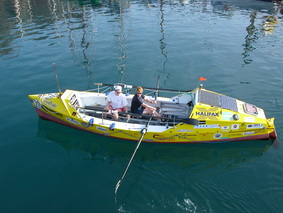
Sally and her Mum's first Trip Together in the boat - "..you can't sit up inside it ...hot,sweaty and smelly as a Turkish sauna.."
First of all, you will need to decide whether to join a race, or to risk going off on your own. This is a tricky choice. Many would-be rowers find the structure of a race reassuring, not least because much of the bureaucratic red tape will be handled by organizers like Woodvale Events
www.woodvale-challenge.com
or the Ocean Rowing Society
www.oceanrowing.com
rather than the enthusiastic but inexperienced newbie rower.
Frankly, most applicants don’t know their aft from their elbow, and will have enough to do organising themselves and their boat. Tagging along with the rowing equivalent of the ARC gives many an average (for an ocean rower) Joe access to the sport. It takes a really outrageous degree of dedication and fortitude to organise a crossing entirely on your own, and this is an exclusive club not many have chosen to join.
Of the 294 completed ocean crossings, some 75% have been achieved within a race structure.
www.woodvale-challenge.com
or the Ocean Rowing Society
www.oceanrowing.com
rather than the enthusiastic but inexperienced newbie rower.
Frankly, most applicants don’t know their aft from their elbow, and will have enough to do organising themselves and their boat. Tagging along with the rowing equivalent of the ARC gives many an average (for an ocean rower) Joe access to the sport. It takes a really outrageous degree of dedication and fortitude to organise a crossing entirely on your own, and this is an exclusive club not many have chosen to join.
Of the 294 completed ocean crossings, some 75% have been achieved within a race structure.
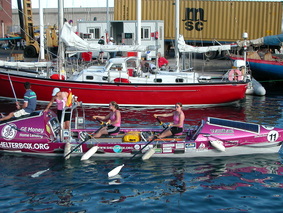
"I was horrified at the idea that only 10mm of marine ply would separate me from water seven miles deep..."
In races, rowboats are backed up by a support yacht. The support given should not, however, be overestimated.
The yacht is more useful as a reassurance to families at home than as direct support to the rowers. It is generally hundreds of miles from the nearest crew, which is more than can be said for passing tankers.
The yacht and her immensely capable crew are, however, instrumental in preventing dramas from turning into crises – by replacing broken oars, guiding teams through medical incidents, offering advice
on failing watermakers, and dispensing aid and comfort by satphone.
Once you have decided that you will take part, you will need a boat. In early races, crews had no choice; there was only one design on offer, the Rowsell and Morrison ‘Atlantic Rowing Race’ design. This arrived on the doorstep as a flatpack, with an instruction manual the size of a telephone directory.
The ARR, as it has become known, is now synonymous with the sport It is about 23ft long by 6ft wide, designed ‘to accommodate two people with their stores, and to allow simple construction worldwide’.
When I first saw it I was horrified at the idea that only 10mm of marine ply would separate me from water seven miles deep. The ARR is quite a big boat to row. Fully laden, it can weigh upwards of a ton. Living on the boat is best described as camping at sea, except that instead of hills and cows, it’s waves and whales.
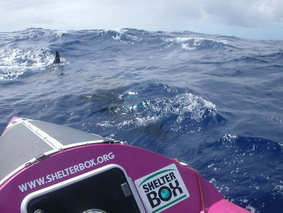
I do not come from a yachting background, so all the technical stuff made a steep learning curve for me. For my first attempt
we decided to buy a secondhand boat - there was no way I was going to sea in anything I had glued together myself, and furthermore there seemed to be a faint chance that a boat that had made the crossing before might remember the way.
In the months leading up to the start we refurbished our craft and fitted solar panels to power the car batteries stored in the cabin. We updated our electrical equipment, VHF, satphone, GPS, and we installed the PUR40 watermaker that would supply a decent quantity of soapy-tasting dishwater for the journey ahead, providing the sun shone.
Emergency water supplies -sealed bottles of potable water only to be broken open in a dire emergency served as our ballast. This was specified by race rules. It was intended to stop zealously competitive rowers from ditching their ballast to lighten their load and achieve a swifter crossing, removing in the process the self-righting capabilities of their craft.
All the electrical gubbins was stored in the cabin. This is a space roughly the size of a two-man tent. You can’t sit up inside it, and it almost instantly becomes as hot ,sweaty and smelly as a Turkish sauna. It is, however, your only refuge from the full force of the ocean.
Personal modifications to the boat generally fall foul of the race rules, but its colour is entirely up to you. It always surprised me that many contestants sported the soothing wave-like hues of white and blue. Camouflage was not my plan. I decided on dayglo orange for the first trip, and ‘great in peril’ pink for the second, on the grounds that if it all went wrong, the rescuing tanker would find it easy to spot us among the rollers.
Plan as you may, nothing can prepare you for the difficulty of the journey. Although rowers may spend a year and a half physically training, no rowing machine can replicate the constant, demoralizing day-to-day plod, let alone the despair when the wind blows in the wrong direction and you find yourself heading for Africa instead of the Caribbean.
And don’t even think that you’ll have the opportunity to lament your woes with fellow rowers! Within twenty minutes of the starting canon’s boom, the fleet will have disappeared among the nauseating chop of the Canary Islands acceleration zone.
Any promises to call you made on the pontoon are soon forgotten once you’ve settled into your schedule. For racing crews, two and half hours sleep on the night shift is generous. You can barely speak to the person sitting in front of you, let alone have a jolly conversation with the lads on Two Blokes No Smokes or Atlantic Warrior.
Routines differ from boat to boat, but most bottoms only last two hours in the saddle.
"..My own bottom, which I have pampered and treasured for its peachiness, was ravaged by the hardships of life at sea into a bumpy, boil-cratered lunar landscape..."
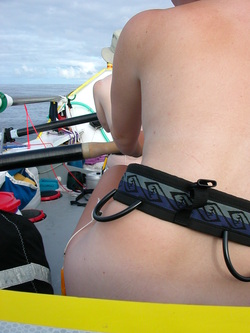
Naked Rowing
People tell you that the first two weeks are the worst, and they are right. If you can get through that fortnight, you will make it to the end.
The seasickness, exhaustion and diet of dehydrated food take their toll early on. When you adapt, the deprivation can turn into a liberation that gives you a deeper appreciation of the life you left behind –apart from which, the voyage has a value of its own. I mean, how often do you get to see all the phases of the moon, from jaw-dropping fullness, to grinning sliver, to
spangled black absence?
How often do you get to swim with passing whales, or coax a noddy bird to sit on your head? Or spend your nights rowing through space - for rowing an ocean at night is like being at sky, not at sea. You are so low to the water that you are almost entirely surrounded by the heavens.
You have the sensation of flying, with only the gentle lapping of water and the distant calling of whales to remind you that the ocean lies beneath.
There is, however, a downside. Having spent six months in a rowboat the size of a small bathroom I can confidently assert that the sport is not one for the glamorous. My own bottom, which I have pampered and treasured for its peachiness, was ravaged by the hardships of life at sea into a bumpy, boil-cratered lunar landscape. My hands, once delicate and feminine, became claw-like and blistered. My voluptuous curves were replaced by sunburnt skin tautly stretched over a jutting skeleton.
"If you want to lose a lot of weight quickly and aren’t too fussed how, twelve hours of rowing a day on a diet of dehydrated army rations is definitely worth considering."
You may by now be asking yourself whether you are the ideal candidate for a trip across the tropics in a 23ft floating bathroom. To help you make a judgment, here are a sample of the personal qualities required:
1. Expendable bottom.
2. Few or preferably no marbles.
3. Little or no sea experience.
4. Bloody-minded determination of Attila the Hun.
If you tick these boxes, then source the equipment, learn the skills, and set oars armed with one thought only – to make
it across. The series of decisions that carries most ocean rowers from ignorance to enlightenment takes about a year and a half. Much of that time is spent raising money to fund the trip. It costs£50-£100,000.
There aren’t many people with that sort of money hiding between the sofa cushions, and certainly I didn’t
have it. There is, however, an important piece of advice handed out by the rowing fraternity: if you can get to the start, then you can get to the finish.
The above is an outline of how do do it.
Perhaps a better question is why.
On the face of it, nobody in their right mind would sanely chose to take on a mighty ocean in a tiny wooden rowing boat. George Mallory and subsequent thousands of adventurers have claimed that they did whatever they did because it was there.
I can unequivocally say that this is not the reason I spent almost five years of my life rowing or planning to row the Atlantic.

Sally Kettle during a trek to the Chemin De La Liberte (Pyrenees) to raise money for The British Royal Legion
A friend once told me;
‘happy people don’t climb mountains’.
I have come to realise the truth in that saying.
The need to achieve on such a grand scale can perhaps be attributed to a deep-seated desire to change your circumstances - to prove to yourself and others that you are capable, courageous, and alive.
Looking back on it now, this is definitely why I made the decision to brave it at sea.
Surrounded by seemingly more successful contemporaries, I saw my life drifting along with very little to show for it.
Under-confident and unable to make decisions about my future career, I saw my first Atlantic row as an opportunity to change my life.
It did, but not altogether in the way I expected. What I had not expected was the change it brought about in the relationships I had with some of the most
important people in my life –particularly my mother.
I’m sure many say it, but my childhood didn’t feel like a walk in the park. By the time I got to my teens, my relationship with my mother had deteriorated to the point where we rarely spoke.
When we did communicate, it usually descended into an argument. But it was my mother who ended up joining me on my rowing boat, setting out to row the Atlantic Ocean with barely two months rowing experience and with no nautical skills on her balance sheet.
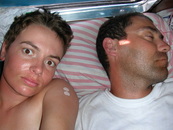
Sally and Marcus first trip attempt
It was an accident, really. Marcus, my first rowing partner and my boyfriend at the time, had epilepsy.
In fact the whole charitable purpose behind the first row we planned was
to raise funds for research into the condition.
Four days into the adventure, Marcus
suffered an epileptic seizure and needed to withdraw. After a year and a half’s
preparation I was determined to get the boat across. For one thing, we had
raised £268,000 for The Fund for Epilepsy.
For another, I had made a promise to
row the Atlantic, and I wanted to keep it. I had also made a promise to myself to change my life. So I asked my mother to come with me. If ever there was an
opportunity to repair our ailing relationship, I reasoned, this was it.
So Mum and I entered the Ocean Rowing Society Regatta in 2004, the only women in the fleet of sixteen boats. In fact only fifteen women in the world had ever attempted an ocean row before us. (In 2011, the number of women who have crossed oceans has grown
considerably – as has the number of men).
I later learned that Mum’s reasons
were similar to mine –to be sure that she could, and to prove it to everyone
else.
So, I’ve come to the conclusion that the‘how’ will always look after itself as long as the ‘why’ is strong enough. You can throw yourself into the research to find the right boat, and the fundraising to pay for it, and the training you will need to master it.
But if your ‘why’ lets you down, then ultimately you will fail.
I have seen angsty rowers on La Gomeran pontoons, determined to win the race, hell-bent setting a record. Their ‘why’ is solely about winning.
In my experiencethis isn’t a good enough reason to row an ocean. The Atlantic will do all itcan to humble you, and it will win, and the rowers will be miserable.
If ever there was an appropriate motto for a sport, it is the Ocean Rowing Society’s:
Nosce Te Ipsum –
Know Thyself.
We can all row an ocean, but in knowing ourselves we will discover
the reason why we have chosen to do it.
It is for this very reason that I will
probably never do it again. I am not the under-confident person I once was.
Anyway, Mum and I have our own world record. We are the First Mother and Daughter to Row Any Ocean. Even if it was possible to beat it, why would I want to?
In fact the whole charitable purpose behind the first row we planned was
to raise funds for research into the condition.
Four days into the adventure, Marcus
suffered an epileptic seizure and needed to withdraw. After a year and a half’s
preparation I was determined to get the boat across. For one thing, we had
raised £268,000 for The Fund for Epilepsy.
For another, I had made a promise to
row the Atlantic, and I wanted to keep it. I had also made a promise to myself to change my life. So I asked my mother to come with me. If ever there was an
opportunity to repair our ailing relationship, I reasoned, this was it.
So Mum and I entered the Ocean Rowing Society Regatta in 2004, the only women in the fleet of sixteen boats. In fact only fifteen women in the world had ever attempted an ocean row before us. (In 2011, the number of women who have crossed oceans has grown
considerably – as has the number of men).
I later learned that Mum’s reasons
were similar to mine –to be sure that she could, and to prove it to everyone
else.
So, I’ve come to the conclusion that the‘how’ will always look after itself as long as the ‘why’ is strong enough. You can throw yourself into the research to find the right boat, and the fundraising to pay for it, and the training you will need to master it.
But if your ‘why’ lets you down, then ultimately you will fail.
I have seen angsty rowers on La Gomeran pontoons, determined to win the race, hell-bent setting a record. Their ‘why’ is solely about winning.
In my experiencethis isn’t a good enough reason to row an ocean. The Atlantic will do all itcan to humble you, and it will win, and the rowers will be miserable.
If ever there was an appropriate motto for a sport, it is the Ocean Rowing Society’s:
Nosce Te Ipsum –
Know Thyself.
We can all row an ocean, but in knowing ourselves we will discover
the reason why we have chosen to do it.
It is for this very reason that I will
probably never do it again. I am not the under-confident person I once was.
Anyway, Mum and I have our own world record. We are the First Mother and Daughter to Row Any Ocean. Even if it was possible to beat it, why would I want to?
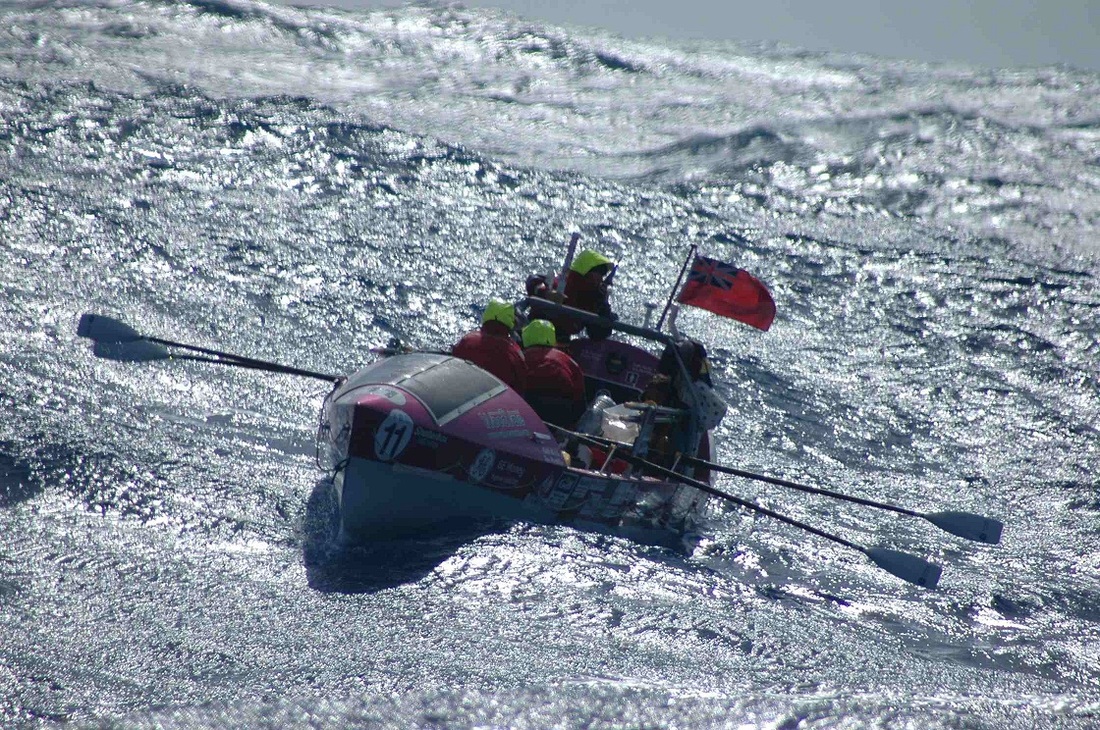
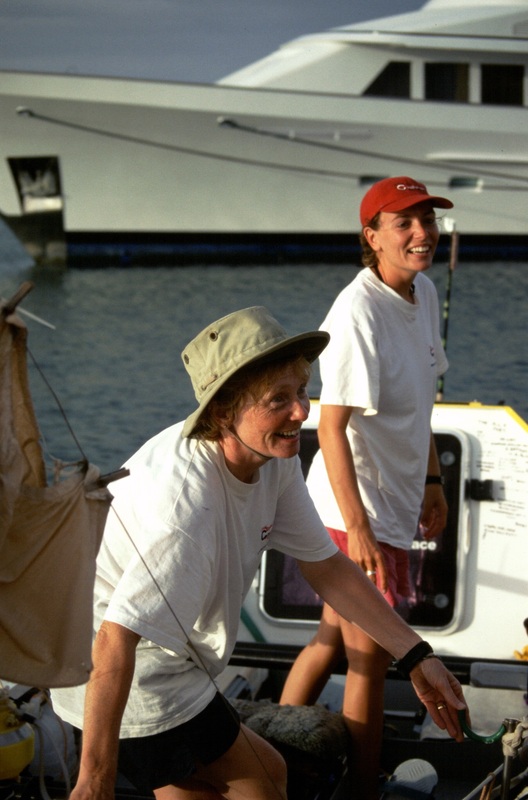

 RSS Feed
RSS Feed
